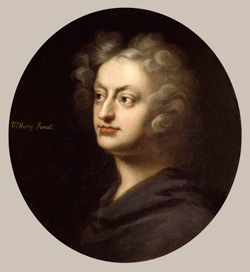by Nicholas Jones

Apollo’s Fire acknowledged that divide in Purcell’s work in this weekend’s concerts, giving us music from both the workaday and the profound composer. Music director Jeannette Sorrell shaped the program sensitively, devoting the first half to two upbeat, catchy celebrations of English royal power, and the second half to a pair of darker, soul-stirring contemplations of mortality, pieces that remain at the top of Purcell’s great legacy.
The program opened with one of the birthday odes for Queen Mary (of William and Mary). Celebrate this Festival is an extended cantata for chorus, soloists, and instrumentalists. Because the queen’s husband was away fighting wars on the continent, Purcell gave us some stirring martial trumpet-and-drum music played by Kris Kwapis and Matthew Bassett. But to honor the queen, Purcell interspersed the heroic mode with quieter moments of contemplation, movingly evoked at one point by a lovely recorder consort played by Debra Nagy, Luke Conklin, and Kathy Stewart. In a notably self-conscious moment, the singers explicitly draw attention to the shift from the military to the domestic, singing “Cease, trumpet, cease.” (One wonders whether the original trumpeter appreciated or resented being openly shushed.)
The birthday ode featured splendid playing by the Apollo’s Fire orchestra, as wonderfully tuned and rhythmically vital as ever, led by concertmaster Olivier Brault. The rich line-up of vocal soloists included sopranos Molly Quinn and Molly Netter, mezzo-soprano Amanda Powell, countertenor Eric Brenner, tenor Karim Sulayman, and bass Jeffrey Strauss. Incidental solos were taken by choir sopranos Margaret Carpenter Haigh and Madeline Healey.
Though saddled with some indifferent poetry — “Kindly treat Maria’s day, / And your homage ‘twill repay” — Purcell always makes his text come alive with clear and tuneful lines. Each of the excellent soloists was given a chance to shine. Especially winning were the several soprano duets.
The excellent continuo section drew attention to Purcell’s vibrant bass lines — cellist René Schiffer, gambist Rebecca Landell Reed, bassist Sue Yelanjian, organist Peter Bennett, theorbists John Lenti and William Simms, with Sorrell at the harpsichord. At some points in the performance on Saturday at First Baptist, the sheer number of continuo players overshadowed the vocal soloists.
Some beguiling pastoral music from the semi-opera King Arthur followed after the birthday ode. This apparently simple “shepherd music” is nonetheless highly sophisticated, and the ensemble delivered it with rhythmic energy and evident delight in Purcell’s inventiveness.
The second half changed the mood dramatically. After a somewhat overwrought performance of the sailor’s song from Dido and Aeneas, an improvised set of variations for solo guitar performed by William Simms took us directly into the famous chaconne of Dido’s lament. Amanda Powell gave the abandoned queen’s aria an appropriately hair-raising intensity, tempered by a somber beauty.
The beginning of the final piece, the Funeral Music for Queen Mary, overlapped with the last chord of Dido’s lament, a drum suddenly announcing a dead march. This starkly magnificent canzona, originally intended for four trumpets, was played here on flute, oboe, taille (alto oboe), and cello.
Written more than 300 years ago for a monarch who is now mostly forgotten, the funeral music nonetheless has immediacy, relevance, and impact. The texts, drawn from the ancient liturgy for the dead, move us through a dark meditation (“in the midst of life we are in death”) to an earnest prayer (“suffer us not . . . to fall from thee”). The flawlessly composed music displays a kind of effortless virtuosity, deploying its emotional power with a complete absence of showiness. The choir sang these “funeral sentences” gracefully and expressively.
As the music came to an end, the lights in the nave were gradually extinguished. Led by the drummer, Sorrell and the soloists proceeded slowly down the aisle of the darkening church to the reprise of the dead march. The moment was at once musical and theatrical, majestic and personally affecting — all qualities that were obviously dear to Purcell.
A standing ovation was rewarded with a lovely encore for soloists and choir, “No stars again shall hurt you from above,” from The Tempest.
Published on ClevelandClassical.com October 11, 2016.
Click here for a printable copy of this article


